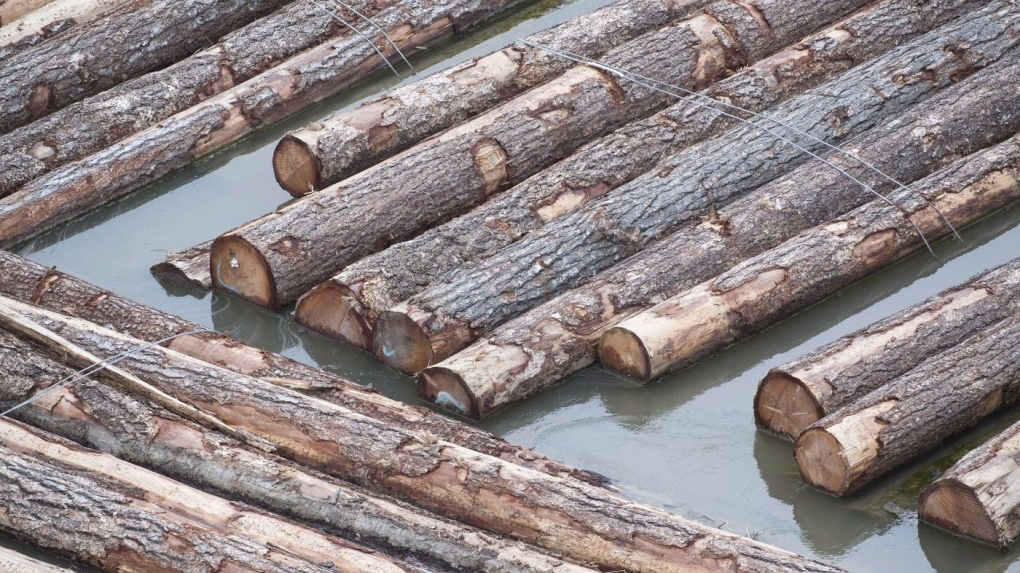B.C. to dedicate some provincial timber supply to value-added industry
 Logs are pictured in the waters of the Fraser River in Richmond, B.C., Tuesday, April 25, 2017. (THE CANADIAN PRESS/Jonathan Hayward)
Logs are pictured in the waters of the Fraser River in Richmond, B.C., Tuesday, April 25, 2017. (THE CANADIAN PRESS/Jonathan Hayward)
The British Columbia government is launching a new program that will ensure dedicated access to the provincial timber supply for secondary manufacturers that make value-added products.
Forests Minister Bruce Ralston says the goal is to build a stronger, more resilient forest industry with value-added products such as mass timber, plywood, veneer, panelling and flooring.
The government says in a statement that those products are increasingly in demand as alternatives to carbon-intensive construction products such as cement, resulting in steady job growth in the province.
The statement says the program will be restricted to those facilities that have minimal or no forestry tenure and are approved as a value-added manufacturer.
Figures show overall harvest levels in the forest industry in B.C. have decreased in the past decade, but employment in the value-added sector has grown by about 35 per cent since 2012.
Paul Rasmussen, with the Interior Lumber Manufacturers' Association, says they're encouraged to see the government recognize that a dedicated fibre allocation for the value-added sector is required.
This report by The Canadian Press was first published Jan. 24, 2023.
CTVNews.ca Top Stories

Air traveller complaints to Canadian Transportation Agency hit new high
The Canadian Transportation Agency has hit a record high of more than 71,000 complaints in a backlog. The quasi-judicial regulator and tribunal tasked with settling disputes between customers and the airlines says the backlog is growing because the number of incoming complaints keeps increasing.
LIVE B.C. seeks ban on using drugs in 'all public spaces,' shifting approach to decriminalization
The B.C. government is moving to have drug use banned in "all public spaces," marking a major shift in the province's approach to decriminalization.
Orca calf that was trapped in B.C. lagoon for weeks swims free
An orca whale calf that has been stranded in a B.C. lagoon for weeks after her pregnant mother died swam out on her own early Friday morning.
AFN chief says Air Canada offered a 15% discount after her headdress was mishandled
After the Assembly of First Nations' national chief complained to Air Canada about how staffers treated her and her ceremonial headdress on a flight this week, she says the airline responded by offering a 15 per cent discount on her next flight.
Sophie Gregoire Trudeau on navigating post-political life, co-parenting and freedom
Sophie Gregoire Trudeau says there is 'still so much love' between her and Prime Minister Justin Trudeau, as they navigate their post-separation relationship co-parenting their three children.
U.S. flight attendant indicted in attempt to record teen girl in airplane bathroom
An American Airlines flight attendant was indicted Thursday after authorities said he tried to secretly record video of a 14-year-old girl using an airplane bathroom last September.
76ers All-Star centre Joel Embiid says he has Bell's palsy
Philadelphia 76ers All-Star centre Joel Embiid has been diagnosed with Bell’s palsy, a form of facial paralysis he says has affected him since before the play-in tournament.
DEVELOPING Bird flu outbreaks: WHO weighs in on public health risk
The current overall public health risk posed by the H5N1 bird flu virus is low, the World Health Organization said on Friday, but urged countries to stay alert for cases of animal-to-human transmission.
Island near Mull of Kintyre for sale for US$3.1 million
An idyllic 453-acre private island is up for sale off the west coast of Scotland and it comes with sandy beaches, puffins galore, seven houses, a pub, a helipad and a flock of black-faced sheep.
































